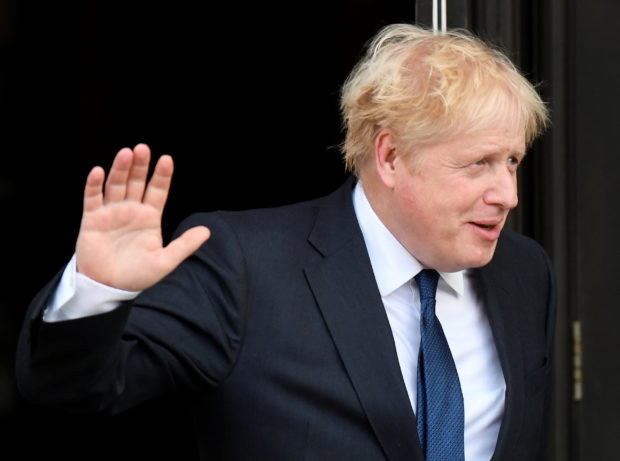Boris Johnson: Brexit hero under pressure

Britain’s Prime Minister Boris Johnson gestures as he walks out of his hotel during the annual Conservative Party conference, in Manchester, Britain, October 3, 2021. REUTERS
LONDON — British Prime Minister Boris Johnson has long defied political gravity, but is hoping his characteristic optimism can sustain him through the fallout from the coronavirus pandemic, Brexit and global supply problems.
Labour shortages and rising energy prices are fueling a cost-of-living crisis.
But he is set to adopt a bullish tone when he addresses his ruling Conservatives’ annual conference on Wednesday, in person for only the second time since becoming prime minister in 2019.
The previous 18 months have already been challenging after death tolls from Covid-19 in Britain soared to among the highest in Europe and Johnson himself nearly died in the pandemic.
Adversity
Johnson, 57, became prime minister in July 2019, consolidating power six months later with a landslide general election victory on a pledge to “Get Brexit Done” — and reap the benefits.
Article continues after this advertisementBut despite agreeing to a trade deal with Brussels, leaving the bloc — ending free movement of people and workers — has been less than orderly, and exacerbated by the pandemic.
Article continues after this advertisementA lack of foreign workers, locked out by new post-Brexit immigration rules or Covid-19 travel restrictions, has caused staff shortages in several sectors, including haulage.
That has hit supply chains, leaving supermarket shelves empty, and raised fears of a less-than-merry Christmas with turkeys and toys running short.
Meanwhile, with energy prices on the rise, Johnson has faced a backlash after breaking an election promise by raising taxes on workers starting next April to fill budget gaps in health and social care.
But the prime minister, who admires strong Conservative predecessors such as Winston Churchill and Margaret Thatcher, has remained adamant he is setting Britain on a prosperous course.
With some in his party increasingly nervous about what the coming winter could hold, Johnson is counting on his innate positivity and vows of future “sunlit uplands” still resonating with voters.
‘World king’
Alexander Boris de Pfeffel Johnson was born in New York in 1964. His sister said that as a child he wanted to become “world king”.
He spent part of his childhood in the EU capital Brussels, where his father Stanley worked for the European Commission, and later attended the elite Eton school in England before studying Greek and Latin at Oxford University.
In his biography “Boris Johnson: The Gambler”, released last October, journalist Tom Bower recounts the serial womanizing that put paid to Johnson’s two marriages and his relaxed relationship with the truth.
Johnson is believed to have at least six children, including a baby boy with his latest wife Carrie Symonds, 33, who is also expecting their second child.
He first worked as a journalist for The Times, where he was sacked for making up a quote, and moved on to become Brussels correspondent for the Daily Telegraph newspaper.
There he made his name by writing “Euro-myths” — exaggerated claims about the EU such as purported plans to standardize the sizes of condoms and bananas.
Johnson then entered politics but, in 2004, he was sacked from the Conservatives’ shadow cabinet for lying about an extra-marital affair.
He rallied to become mayor of Labour-voting, staunchly pro-European London in 2008, an achievement commentators put down to his brazen refusal to respect convention.
Brexit ‘lies’
Johnson felt torn about which way to leap in Britain’s 2016 Brexit referendum, famously drawing up a list of pros and cons for EU membership before throwing his political charisma behind the “leave” campaign.
His popularity, and propensity for exaggeration, helped swing the bitterly divisive campaign, and he intervened in July 2019 to end the subsequent political paralysis by seizing control of the Conservative party from Theresa May.
She resigned after failing three times to get her EU divorce deal through parliament.
Within six months, Johnson had renegotiated the deal, won an election and taken Britain out of the EU.
“Those who did not take him seriously were wrong,” French President Emmanuel Macron said at the time. But he accused Brexiteers of indulging in “lies and false promises”.
Even fellow Conservatives have attacked Johnson’s perceived mendacity.
Former attorney general Dominic Grieve described him as a “vacuum of integrity” over a contentious revamp of his Downing Street flat.
Johnson also has a long trail of contentious remarks in print, attacking women, gays, black people and Muslims.